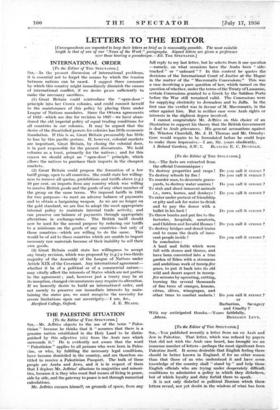INTERNATIONAL ORDER
LETTERS TO THE EDITOR
[Correspondents.urt requested to keep their Zellers as brief as is reasonably possible. The most suitable length is that of one of our "News, of the Week ",paragraphs. Signed letters are given a preference over those bearing a pseudonym.—Ed. THE SPECTATOR.] [To the Editor of THE SPECTATOR.] SIR,—In the present discussion of international problems, it is essential not to forget the means by which the tension between nations can be eased. I suggest three measures by which this country might immediately diminish the causes of international conflict, if we desire peace sufficiently to make the necessary sacrifices.
(1) Great Britain could reintroduce the " open-door " principle into her Crown colonies, and could commit herself to the maintenance of this policy by placing them under League of Nations mandates. Since the Ottawa agreements of 1932—which are due for revision in 1937—we have aban- doned the old imperial policy of equal trading conditions for all countries in our colonies. It may be argued that the desire of the dissatisfied powers for colonies has little economic foundation. If this is so, Great Britain• presumably has little to lose by this pacific gesture. If, however, colonial markets are important, Great Britain, by closing the colonial door, is in part responsible for the present discontents. We hold colonies as a trust, primarily for the natives ; and for this reason we should adopt an " open-door " principle, which allows the natives to purchase their imports in the cheapest markets.
(2) Great Britain could propose the formation of a low tariff group, open to all countries. She could state her willing- ness to remove all quotas, prohibitions and tariffs above (e.g.) 10 per cent. on imports from any country which was willing to receive British goods and the goods of any other member of the group on the same terms. . We, imposed tariffs in 1931 for two purposes—to meet an adverse balance of payments- and to obtain a bargaining weapon. As we are no longer on the gold standard,, we are free to adopt the most appropriate internal policy to maintain internal trade activity, and can preserve our balance of payments through appropriate alterations in exchange-rates. The British tariff should now be used for the second purpose by reducing our tariffs to a minimum on the goods of any countries—but only of those countries—which are willing to do the same. This would be of aid to those countries which are unable to import necessary raw materials because of their inability to sell their own goods.
(3) Great Britain could state her willingness to accept any treaty revision, which was proposed by (e.g.) a two-thirds majority of the Assembly of the League of Nations under Article XIX of the Covenant. Any international agreement— whether it be of a political or of a commercial nature— may vitally affect the interests of States which are not parties to the agreement ; and, however just a treaty may be at its inception, changed circumstances may require its alteration. If we honestly desire to build an international order, and not merely to preserve our immediate interests by main- taining the status quo, we must recognise the necessity for severe limitations upon our sovereignty.—I am, &c.,














































 Previous page
Previous page